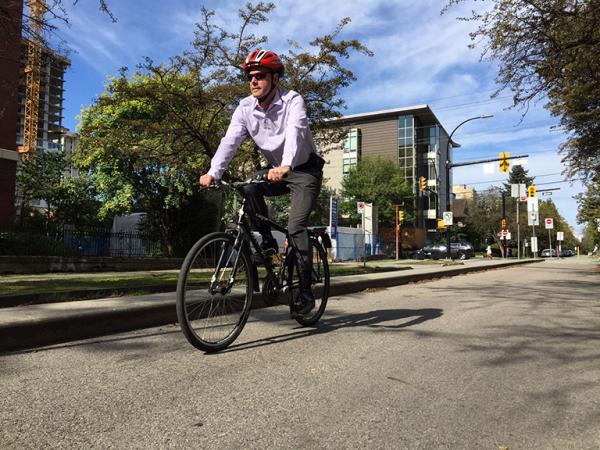Vancouver, September 21, 2017 – Physical activity of any kind can prevent death and heart disease, according to an international team of scientists, including St. Paul’s Hospital researcher Dr. Scott Lear. The large international study involving more than 130,000 people from 17 different countries was led by the Population Health Research Institute of McMaster University and Hamilton Health Sciences.
In the Prospective Urban Rural Epidemiology (PURE) study, Dr. Lear and his team demonstrated people can partake in any activity to meet the current guideline of 30 minutes of activity a day, or 150 minutes a week, to raise the heart rate. Although previous research from high income countries shows leisure time activity helps prevent heart disease and death, the PURE study also includes people from low and middle-income countries where leisure time physical activity isn’t as prevalent.
“By including low and middle-income countries, we were able to determine the benefits of activities such as active commuting, having an active job or even doing housework,” says Dr. Lear, principal investigator. He adds that one in four people worldwide do not meet the current guideline and that number is nearly triple in Canada. Lear holds the Pfizer/Heart & Stroke Foundation Chair in Cardiovascular Prevention Research at St. Paul’s Hospital and is a professor of Simon Fraser University’s Faculty of Health Sciences.
The PURE study showed that by meeting these guidelines the risk for death from any cause was reduced by 28 per cent while heart disease was reduced by 20 per cent, regardless of the type of physical activity. The benefits also continued at very high levels with no indication of a ceiling effect; people getting more than 750 minutes of brisk walking per week had an even greater decrease in risk of death. While very few participants achieved this level of physical activity from leisure activity, nearly two out of five did from everyday activities such as commuting, being active at work or doing household chores.
Dr. Lear says that in order to realize the full benefits of physical activity, it needs to be incorporated into daily life. “Going to the gym is great, but we only have so much time we can spend there. If we can walk to work, or at lunch time, that will help too.”
“In low and middle income countries, having heart disease can cause a severe financial burden. Physical activity represents a low-cost approach that can be done throughout the world with potential for a large impact,” says Dr. Salim Yusuf, director of McMaster’s Population Health Research Institute and the PURE study’s principal investigator. “More than one in 12 deaths could be prevented if everyone was active for at least 150 minutes per week over five years”
The PURE study was led by the Population Health Research Institute and conducted in over 70 sites in 17 countries. It is funded from more than 50 sources, including the Population Health Research Institute at McMaster University, the Heart and Stroke Foundation of Ontario, the Canadian Institutes of Health Research, and the Ontario SPOR Support Unit.
Providence Health Care (PHC) is one of Canada’s largest faith-based health care organizations, operating 17 health care facilities in Greater Vancouver. PHC operates one of two adult academic health science centres in the province – St. Paul’s Hospital – performs cutting-edge research in more than 30 clinical specialties, and focuses its services on six “populations of emphasis”: cardio-pulmonary risks and illnesses, HIV/AIDS, mental health, renal risks and illness, specialized needs in aging and urban health. www.providencehealthcare.org.
The Population Health Research Institute (PHRI) is a joint Research Institute of McMaster University and Hamilton Health Sciences Corporation. It is Canada’s premiere global health research institute and a world leader in large clinical trials and population studies. Originally formed with a focus on cardiovascular disease (CVD) and diabetes, PHRI’s research areas have broadened to include population genomics, perioperative medicine and surgery, stroke, thrombosis, renal disease, and obesity, with unparalleled expertise in epidemiology, population health and clinical trials. For more information, please visit www.phri.ca.
For interviews with Dr. Scott Lear in Vancouver:
Elaine Yong
Sr. Communications Specialist – Media Relations
Providence Health Care
eyong@providencehealth.bc.ca
Tel: (604) 682-2344 extension 66987
Cell: (604) 837-6003
For interviews with Dr. Salim Yusuf in Hamilton:
Veronica McGuire
Media Relations
Faculty of Health Sciences
McMaster University
vmcguir@mcmaster.ca
Tel: (905) 525-9140 extension 22169

